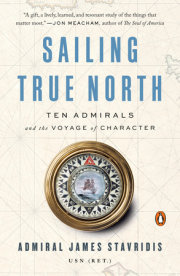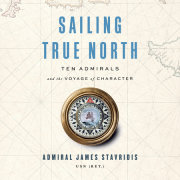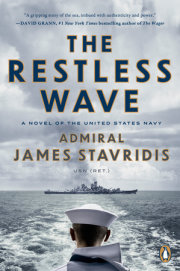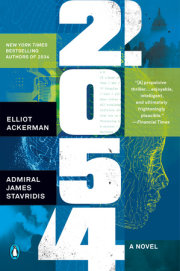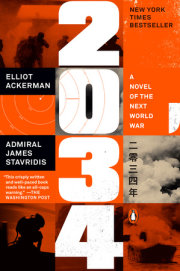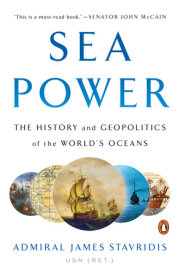Chapter I
The Power of Persuasion
Themistocles
Born c. 524 b.c., Athens, Greece
Died c. 459 b.c., Magnesia, modern Turkey
I first heard of Themistocles when I was an eight-year-old boy. My family had just moved to Athens, Greece, because my father, a major in the US Marine Corps at the time, had received orders to be the assistant naval attachŽ at the local US embassy. He had been chosen for this assignment for a simple reason: he was Greek American, and his first language was Greek. Although he was born in the United States, his was an all-Greek-speaking home and, until he went to elementary school as a five-year-old, he'd spoken only Greek. After combat tours in Korea and a stint earning a master's degree at Purdue, he was now, in the mid-1960s, being sent to the land of his forefathers. My mother, not of Greek stock, began taking lessons in the language. I just wanted to be sure my bicycle was in the shipment.
As part of preparing to move to Athens, my father began to talk to me about Greece. He began with mythology, fascinating me with stories of the gods of Olympus. Zeus, Poseidon, Athena, Hephaestus, Ares, and many others started to populate my dreams. After we covered the gods, he shifted to Homer, and I learned the stories of the Trojan War, and about the wily Odysseus and his long voyage home to Ithaca. Even as a small child, I knew these were fables and stories, representing only some part of the truth. But after Homer, we began to talk about the real history of ancient Greece.
My father told me about the half-century nightmare of the Persian invasions of Greece between 499 and 449 b.c. A terrific natural storyteller, he laid out the saga of those years in bold, vivid strokes. I still cherish the recollection of his description of the Battle of Marathon in 490 b.c. and (of course) the heroic stand of the three hundred Spartans at the Battle of Thermopylae in 480 b.c. I loved the story of the monument there, which has carved upon it the words, "Go tell the Spartans / stranger passing by / that here, faithful to their laws / we lie." During those years in Greece, my father brought all those tales to life by taking the family to visit the sites of each of those famous battles.
Much as I enjoyed learning about the Spartans, my favorite of my father's stories-then and since-was that of Themistocles, the Athenian admiral who won the pivotal Battle of Salamis, also in 480 b.c. Numbers are always hazy in ancient historical battles, of course, but by most estimates the Greeks were outnumbered roughly five to one in the amount of heavy trireme warships with their triple banks of oars. After luring the Persians into the constrained waters of the Straits of Salamis off the coast of Athens, Themistocles led the free Greeks under his command to a smashing victory over the enslaved oarsmen of the Persian foe.
I asked my father again and again to tell me the story of Themistocles. At the time, I didn't appreciate the complexity of the ancient admiral's life and character-he simply loomed large as the winner of the most important naval battle fought by the ancient Greeks. And, though I often reenacted the battle with a set of toy ships on a hand-drawn map of the Bay of Salamis, the part of the story that most captivated my imagination was Themistocles's ability to inspire his men. I wondered what it was about him that allowed him so successfully to lead men into battle. My father tried to explain to me the complex mixture of charisma, inspiration, and rhetoric that Themistocles employed; although all of those words were well beyond my vocabulary at the time, I have since turned to them on many occasions.
In one such instance, I was searching for the right words for a huge dinner event as part of a patriotic celebration in New York City in November 2007. The title of the event was "A Salute to Freedom," and after quite a bit of thought, I ended up talking about our heroic US Navy SEALs by telling the story of Themistocles and his oration that had so deeply inspired the Greeks some 2,500 years before. And in the years since then, I have spoken many times about that battle and the character of Themistocles.
My father, who eventually retired as a full colonel of Marines and went on to lead a huge community college after earning a PhD in education, had passed away by the time of that 2007 speech; but I know he would have been very proud to hear his son, by now improbably a four-star admiral, retelling the story of Themistocles to a big New York audience. Almost half a century after he told me the timeless stories of an ancient Greek admiral, I was able to keep that inspirational character alive, down the long centuries, by echoing his words that we must all "row for freedom." That is a powerful lesson, and one I've carried with me, drawing upon Themistocles over and over.
What do we know of this ancient admiral, and what can we learn from his voyage of character? Various ancient sources paint a vivid but inconsistent image of the historical Themistocles. Rather than a crisp factual narrative, we have a mosaic of sharp, short vignettes of his life from two of the earliest Greek historians: Herodotus and Thucydides. Although they are described as the first modern historians, the work of neither would hold up to modern standards; moreover, their separate approaches and biases led them to draw quite different conclusions about Themistocles. Herodotus, writing about the Persian Wars which distinguished Themistocles's career, saw the admiral as a greedy swindler; Thucydides, writing about the origins of the Peloponnesian War decades later, portrayed Themistocles as a tragic hero who saved Greece only to be exiled by his own city. Both, however, are clear that Themistocles was a remarkably influential and self-assured voice in military and political life.
Themistocles was born in Athens about 524 b.c. In 508, just as he was entering into maturity, the city began its experiment in democracy by giving all free men the right to vote-a radical move for the time, but we should be careful to note that the privilege extended to only a very few of the city's inhabitants. Nevertheless, it allowed the solidly middle-class young Themistocles to enter Athenian political life on rough par with any other citizen. He grew up in a time of heady change, full of opportunity and challenge, and quickly established himself as a voice in his thriving city-state. From the earliest days of his life, he would have been part of a society that was both prideful of its position at the top of the Greek hierarchy of city-states but also a society under stress and challenge from lesser nations in the Hellenic world, as well as the "looming tower" of his day-the massive Persian Empire to the east.
We do not know much personal detail about Themistocles's life before he was elected archon, the chief administrative role in Athens, at the age of thirty-one. In that role, Themistocles distinguished himself early by his speaking ability, upon which Athenian democracy placed a high priority. Once in office, Themistocles quickly and forcefully began speaking out in favor of building Athens into a seagoing power. Crucially, as archon, he commissioned a defended port to be built at Piraeus (the nearest significant harbor to Athens, just a few kilometers distant), which transformed Athens into a sea power almost overnight and continues to serve the city to this day. His was a strategic vision coupled with a practical ability to move supporters, win public arguments, and demonstrate the long-term value in leveraging the seagoing access Athens enjoyed. I have often journeyed to the port of Piraeus from downtown Athens, and in the modern world the two ancient cities are part of a single seamless, contiguous entity. I made the trip in the 1960s as a young boy living in a suburb of Athens, headed to catch a ferry to the islands with my parents; then later in the 1980s as a junior Navy officer coming from my ship to the liberty spots of the Plaka (the strip of bars and restaurants surrounding the Parthenon); as a NATO commander-whisked along with police escorts and in hardened black cars; and most recently as a member of the board of the Onassis Foundation (and shipping company) to visit one of our ships in the harbor. On every occasion, I thought about the vision of Themistocles, who sensed early on the power that a true, defendable harbor would afford the ancient city-state. His ability to "see around the corner" and build that harbor helped save Greece's democracy a decade after his service as archon.
As would the American admiral Alfred Thayer Mahan centuries later, Themistocles understood the geopolitical context better than most, saw sea power and seaborne commerce as the natural destiny of his people, and devoted his early prime years of life to helping make that vision reality. Themistocles knew that the combination of Athens's coastal location and expanding mercantile interests, plus the ever-growing threat of the expanding Persian Empire to the east, made it essential for Athens to develop a navy as a connector and protector between it and the outside world. He also understood the value of building coalitions despite the challenges of uniting the famously fractious Greek cities into rudimentary alliance systems. And he demonstrated not only vision, but also the kind of internal strength of character that allows a leader to carry a position that is not intuitively clear or wildly popular.
When the Persians predictably attacked the politically fractured Greek mainland in 490 b.c., Themistocles was among those Greeks who helped repulse the hated enemy at the Battle of Marathon. After that desperate fight, Themistocles not only never forgot the experience of combat, but he-unlike many of his fellow Athenians-also never let down his guard in anticipation of another Persian attack. Keen observer that he was, Themistocles predicted not only that the Persians would return, but that they would bring a much more powerful navy with them when they did. To survive such an attack, the Athenians would need a navy of their own-but first they had to be convinced of the need to build one. Themistocles consistently made the argument throughout the Athenian polity that building the port was necessary but insufficient to the needs of his nation. Both his vision and his character came into play in making the case for creating real security-these were expensive propositions and there were harsh criticisms of his advocacy for sea power.
Themistocles set about the task of convincing his countrymen of the need for sea power by using his famous oratorical skills, not merely in the abstract but also by trumpeting a time-honored maritime threat: piracy. As the newly appointed commander of the nascent navy he championed, he began talking up the threat posed by pirates on the nearby island of Aegina to give the Athenians a concrete reason to build a fleet without directly referencing the Persians. Luckily for him, as this argument began gaining traction, the obvious money problem was solved by a windfall from a nearby silver mine; with one last oratorical effort, Themistocles persuaded his fellow citizens to put the additional revenue into building the fleet he so fervently sought, ostensibly for antipiracy protection. In this he demonstrated the ability to exercise pragmatic judgment to accomplish a larger purpose-so often we see leaders who lock themselves into a rhetorical position and cannot summon the flexibility to shift arguments when necessary to achieve success. Character requires both conviction and flexibility.
Themistocles got his fleet, and none too soon. He also saw his fears fulfilled as the Persians returned, led by the young, capable, and determined emperor Xerxes I. Xerxes assembled an army of conquest from the far corners of the Persian Empire and descended on Greece from the north-and, as Themistocles had predicted, the Persians did not neglect to bring a powerful navy this time around. The Second Persian War had begun, and the fighting quickly became desperate on both land and sea. This became a time of existential danger for Greece. It is hard to imagine how the world would have shifted from what we know today had the Persians won. Would they have continued west, choking off a nascent Roman Empire? Conquered Europe entirely? Would the superpower of today be Iran, the inheritor of that empire two millennia later? Would democracy-the greatest of Greek contributions to civilization-have emerged when it did? These are, of course, unanswerable questions. But without question, the world we know today would be more than a few degrees of separation different. We are so used to the story of history we know that we tend to think of it as an immutable force. But big doors swing on small hinges, and the fact that Themistocles built a port and a fleet, and was able to stop a Persian fleet, was a seemingly small hinge upon which a big door eventually swung to the west, not east.
Despite Athenian capabilities, Greece overall was initially unprepared for the onslaught. Political divisions and operational bickering between the allied city-states hampered a coherent response. The Greeks eventually settled on a two-pronged strategy. To counter the land invasion, the allies would hold at the strategic choke point of Thermopylae on the eastern coast of mainland Greece, where King Leonidas and his three hundred Spartans (plus a handful of other Greek warriors) would make their legendary last stand to buy time for the rest of the Greeks to assemble. Meanwhile, the Athenian navy led a blocking effort at Artemisium (a seaport on the island of Euboea, north of Athens and near Thermopylae), where they, like the Spartans ashore, delayed the Persians but could not turn them back. Greek land and naval forces fell back to the immediate vicinity of Athens, setting up the conclusive battle against Xerxes's invaders. Themistocles, who was a strong voice in any situation, continued to advocate the idea of striking a maritime blow at the invading forces. He correctly saw that they would be overconfident in their vastly larger numbers, and also were logistically dependent on supplies and reinforcement from the sea.
Rather than sacrifice the inhabitants of the city under siege, Themistocles thought it better to sacrifice the city itself, and persuaded the Athenians to evacuate. Imagine the difficulty of carrying that argument-give up everything you know, surrender your possessions and land, and flee into the scrubby woods around the city. Themistocles argued that Athens could be rebuilt and repopulated as long as her people survived and the Persians were defeated at sea. Abandoning their city to the Persian onslaught, civilians took to the hills while Themistocles and his crews took to their ships and sailed across the Straits of Salamis to take refuge on the island opposite the port of Piraeus. Civilians and sailors alike watched from their sheltering places in the countryside as the Persian army burned Athens and the Persian fleet gathered in its multitudes at the mouth of the straits.
Copyright © 2019 by Admiral James Stavridis, USN (Ret.). All rights reserved. No part of this excerpt may be reproduced or reprinted without permission in writing from the publisher.



